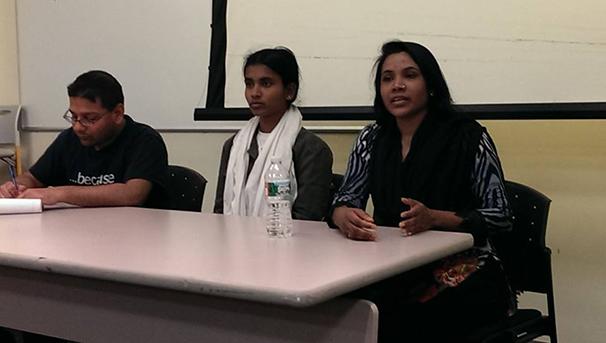
Bangladeshi garment worker Aklima Khanam shared her account of the Rana Plaza factory collapse of April 2013, which killed 1,100 Bangladeshi factory workers, with the NYU community on April 11.
“We heard that the factory was collapsing and we didn’t want to enter, the management told us that they wouldn’t pay wages if we didn’t go into the factory, and then the management became physically abusive,” Khanam said. “The roof collapsed on machines and the machines crushed me. A male worker next to me was killed by the machines collapsing.”
In a presentation at the Kimmel Center for University Life, the Student Labor Action Movement, Khanam and other Bangladeshi labor advocates called for NYU to cut its ties with JanSport in order to compel its parent company, the VF Corporation, to sign the Accord on Fire and Building Safety in light of this tragedy.
“We’re trying to get corporations that operate in Bangladesh to sign onto an agreement that would legally bind them to protect workers,” GLS freshman Cristian Rosa, a SLAM member, said. “We need workers and students working together.”
The accord, which was created by Bangladeshi garment workers, asks for independent investigators to regularly inspect Bangladeshi factories. Rosa said this agreement is crucial for creating safe working conditions in Bangladeshi factories.
The Rana Plaza factory is not owned by the VF Corporation. Yet Khanam and Bangladeshi union leader Aleya Akter said the accident is emblematic of the sub-standard conditions of many Bangladeshi factories. Akter criticized the VF Corporation, which owns 91 factories in Bangladesh, for not signing the accord.
However, VF Corporation spokesperson Caroline Crosslin said the VF Corporation is a founding member of a similar agreement, the alliance for Bangladesh Worker Safety, which she said holds the VF Corporation to an even higher standard than the accord.
“We feel that we were able to make progress much more quickly and efficiently with the alliance,” Crosslin said. “It’s really essential that this issue not be viewed as a competition between groups. We’re all committed to the same goal: creating safe working conditions in Bangladesh.”
Crosslin said the core code, the safety protocol used by the alliance and the accord to grade factory safety standards, was established by the alliance and is now used in inspections of factories owned by members of both the alliance and the accord.
But Akter said the VF Alliance is not what Khanam and the Bangladeshi union wants and does not go far enough to ensure safe working conditions.
“If the VF Corporation signs up for the accord, then by all means continue working with JanSport, but if VF doesn’t sign up for the accord, then we want your university to cut ties with JanSport because what will happen in these 100 factories that VF owns in Bangladesh there will be another Rana Plaza, another Tazreen,” Akter said.
At the end of their presentation, Akter called on NYU students to put pressure on JanSport and the VF Corporation.
“So we’re continuing to organize, and we want to know, are you going to stand with us?” Akter said.
A version of this article appeared in the Monday, April 14 print edition. John Ambrosio is a staff writer. Email him at [email protected].






















































































































































